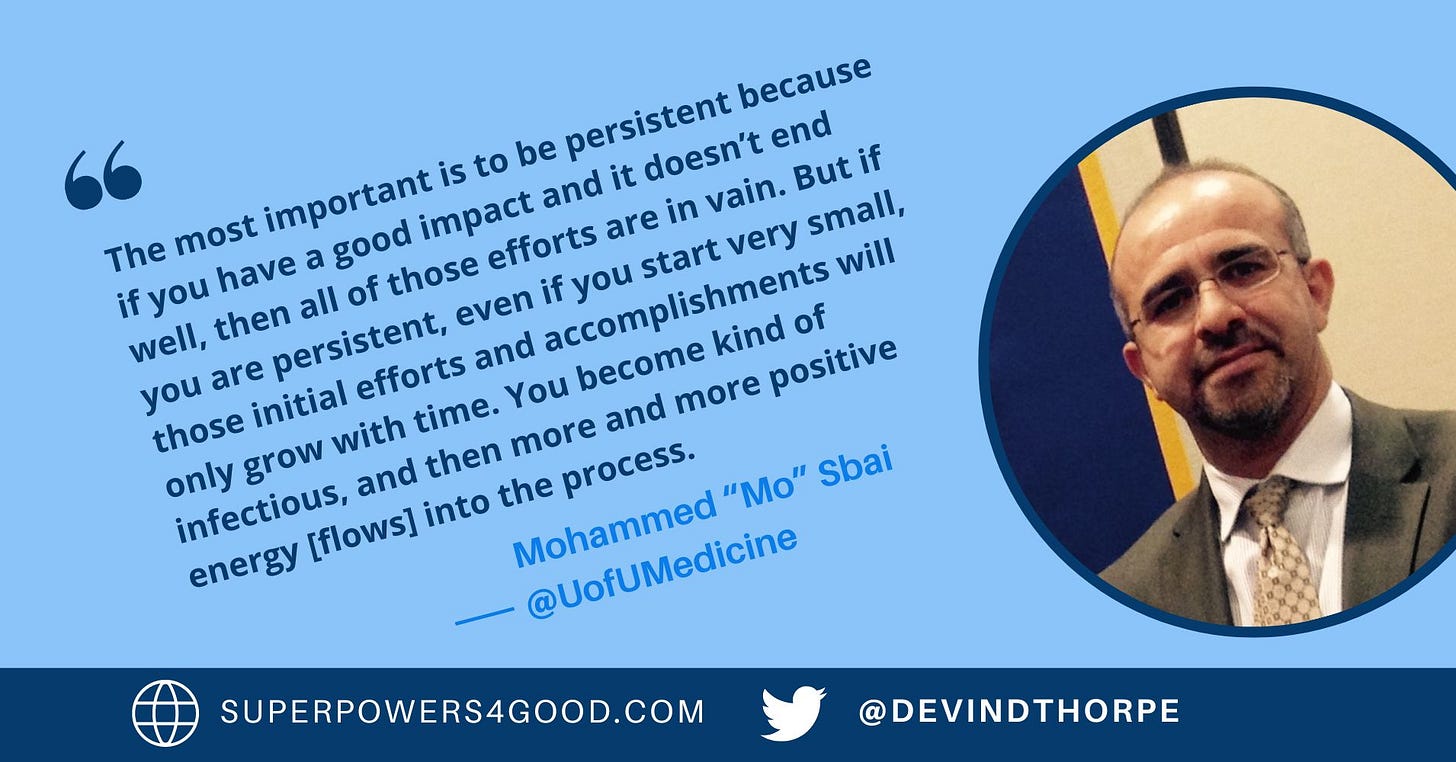Devin: What do you see as your superpower?
Mo: A superpower would be just doing your best to help people in need.
“My older brother suffered in a car accident in Morocco back in 2001,” explains University of Utah neuroscientist Mohammed “Mo” Sbai. “During the process of taking care of him between 2001 and 2007, when he passed away, I got to see firsthand the intricacies and the details and the hard work and the pain associated with the rehabilitation of people with severe neurological deficit.”
“The other important thing that this made me discover is the tragic lack of those services in Morocco,” he says. That realization inspired him to launch a US-based nonprofit to operate a neurorehabilitation center in Marrakech, Morocco.
The Moulay Ali Institute for Rehabilitation (MAIR) now serves about 50 patients per day, having helped almost 400 people recover from traumatic brain injuries and strokes.
The facility is inadequate for local demand, and the waitlist of patients is growing. To meet the demand, Mo is leading efforts to raise $1.8 million to construct a larger facility owned directly by MAIR. The expanded facility would not only be adequate for local needs but would also serve as a model for replication throughout Africa.
Throughout Mo’s career, he’s deployed his simple superpower, doing his best to serve people in need.
AI Summary
1. The Zahra Charity was founded by neuroscientist Mohammed Sbai in honor of his brother, who passed away after a car accident.
2. The charity provides neurorehabilitation services in Morocco, where there is a lack of adequate services for neurological recovery.
3. The clinic has treated close to 400 patients since 2015, but there is an increasing waiting list due to space limitations.
4. The clinic treats approximately 65% of children with cerebral palsy and other conditions caused by birthing complications.
5. The long-term goal of the charity is to build a medical campus for neuro-rehabilitation that will house specialized medical units.
6. The charity emphasizes the importance of persistence and consistency in pursuing charitable work.
7. The clinic began as a small project in 2010 and has since grown to treat more patients per year.
8. The charity’s fundraising efforts aim to expand the facility and gain more resources for neurological recovery.
9. People can learn more about the charity’s work and contribute to its fundraising efforts.
10. The charity’s work is focused on providing much-needed neurorehabilitation services in Morocco.
How to Develop Doing Your Best to Serve Those in Need As a Superpower
Mo’s impact on people needing neurorehabilitation in Morocco is almost impossible to measure. He’s changing lives in dramatic ways, enabling people thought to be beyond hope in a place with no such resources to have happy, more productive lives.
Mo offers tips for developing the superpower of doing your best to serve those in need:
Just believe in what you are trying to do.
You just have to go for it.
It’s good to have an idea that is beneficial, that is humanitarian.
It’s also good to have a good start—if you are lucky to have a good start and make a first impact.
The most important is to be persistent because if you have a good impact and it doesn’t end well, then all of those efforts are in vain. But if you are persistent, even if you start very small, those initial efforts and accomplishments will only grow with time. You become kind of infectious, and then more and more positive energy [flows] into the process.
By following Mo’s example and advice, you can make doing your best for people in need a superpower that enables you to do more good in the world.
Guest-Provided Profile
Mohammed (Mo) Sbai (he/him):
Doctor/ Founder and CEO, The Zahra Charity
About The Zahra Charity: US nonprofit dedicated to creating access to neurorehabilitation in Morocco, North Africa
Website: www.mair-rehab.com and zahracharity.org
Biographical Information: Dr. Mohammed Sbai (aka Mo) lived in Utah since 2000, when he took a faculty position at the University of Utah School of Medicine. He was trained as a clinical neuroscientist at the University of Paris (France), The Roche Institute for Molecular Biology and New Jersey Medical School. He is now part of the faculty at the U College of Health, department of physical therapy, and his work focuses on brain plasticity and its applications for neurorehabilitation. This includes collaborations with the private sector developing therapeutic solutions for stroke, brain and spinal cord injuries and Alzheimer’s disease.
In 2007 Mo lost his older brother (Moulay Ali), who, seven years prior, suffered a severe traumatic brain injury while driving in Morocco. The process of helping his brother recover allowed Mo to discover the tragic lack of neuro-rehabilitative services in that country.
In 2009, Mo founded a Salt Lake City-based nonprofit (Zahra Charity), and thanks to the great support from the U and several other institutions, The Moulay Ali Institute for Rehabilitation (MAIR) opened its doors to patients on September 1st, 2015. MAIR is now a thriving outpatient clinic where patients from all over Morocco are admitted for neurorehabilitative care. This success necessitates expansion of the MAIR clinic in order to accommodate the growing number of patients seeking therapy. The fundraising efforts for this ambitious expansion project are ongoing. The project also involves establishing the first neurorehabilitation curriculum in the country.













